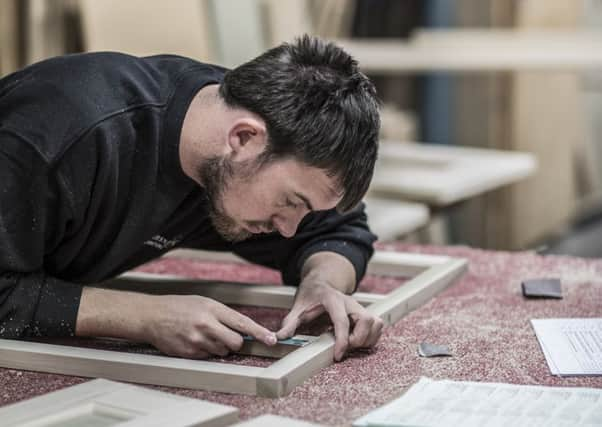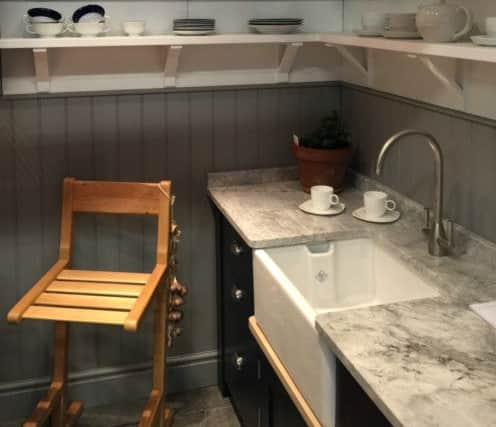A craftsman going against the grain


Many years later Drew would pass on his boat-making skills to disadvantaged young people in Manchester, but not before he had flexed his creative muscles in the homes of London’s glitterati, creating furniture, fittings and fixtures for stars of the stage and screen as a right-hand man to a builder/joiner in the West End.
These days Drew sketches over his formative years with typical modesty, but his experiences in London were to carve the beginnings of a career which turned him from a modest craftsman, struggling to earn a living from a dilapidated workshop, into one of the finest cabinet makers of his generation.
Advertisement
Hide AdAdvertisement
Hide Ad“I can’t say it was something which was in my blood, or which was a huge passion,” says Drew. “My family were musicians so there were no genetic influences. In fact I tried a number of things – including teaching – before this really began to evolve. I had opportunities and I took them. The passion grew with it.”


Now Drew is at the forefront of kitchen design and furniture manufacturing in Yorkshire. His 14,000 sq ft workshop on the outskirts of Hebden Bridge and stylish showroom in the centre of town showcase the classic kitchens which have become his trademark – traditional, handcrafted, high quality designs which combine the finest craftsmanship with streamlined modern living.
Supported by a team of 25 specialist cabinet makers, all local, he supplies bespoke kitchens and furniture to clients throughout Yorkshire, both retail and wholesale, as well as direct to interior designers across the UK, creating hardwood units which will survive long after the mass produced, mid-market alternatives.
Years of experience – 10,000 hours of making, perfecting and designing – have given him the edge in a highly competitive market and shown that traditional skills are as valued today as they were 100 years ago.
Advertisement
Hide AdAdvertisement
Hide Ad“After all these years you know instinctively when something it right or wrong,” he says. “It’s about balance, proportion, detail. Everything is in the detail. These days the customer demands exceptional quality and you have to deliver. There is no standing still. No room for complacency.”
Drew Forsyth’s business story began in the Sixties when he teamed up with a builder to fit doors and build staircases for clients in London’s West End. “He had a 1936 Rolls Royce and we would pile the tools into the back of that and head off down the Portobello Road. I remember making beer engines for pubs and bars in the East End – it was all go with plenty of noise and banter until the middle of the afternoon. Then, every day without fail, everyone fell quiet so we could listen to Play of the Day. I guess that was the start of my career, but it wasn’t a conscious decision – you didn’t plan too far ahead in those days.”
Eventually Drew moved to Manchester where he took a variety of jobs – including a brief spell in teaching – and became involved in youth work building canoes on the canal.
But it was a year at Bolton College, where he took an Advanced Craft course, followed by the move to Hebden Bridge where he became a partner in a joinery business, that set the course for his future.
Advertisement
Hide AdAdvertisement
Hide Ad“We had very basic equipment and seemed to do a lot of pine stripping using a vat of boiling caustic in the cellar,” he recalls. “Then interior fashions changed and the desire to own an English concept kitchen – developed by companies like Smallbone – created a new trend. We were caught up in the fashion industry but we were using traditional methods and craftsmanship.”
Drew’s USP was a high level of craftsmanship which is no longer taught by the modern curriculum.
“It’s all about balance, proportion and attention to detail,” he says. “You need to be able to visualise things and to execute them well. You can only achieve quality through years of experience, long established techniques, learned skills and and an eye for things that no-one else will see but will notice if they are not right.”
Eventually Drew went his own way, setting up as a sole trader in the 1980s, making bespoke pieces for clients in the Calder Valley, and becoming a limited company in the 1990s, by which time he was selling his hand crafted furniture to interior designers across the country.
Advertisement
Hide AdAdvertisement
Hide AdNow employing a team of 25 designers, craftspeople and fitters, Drew is constantly developing and perfecting his designs, using sustainable hardwoods which are kept at a constant “domestic” temperature – in turn created from scrap wood that goes straight into the workshop’s wood-fired boiler. He is currently experimenting with mixed finishes, including driftwood oak, colour and complementary textures.
“We live in a throwaway society, so I try not to waste anything,” says Drew. “I also want to make furniture which lasts a long time and is therefore environmentally friendly.
“I love a challenge and I like the process of taking a piece of wood and turning it into something useful and beautiful.”
There are only a handful of small companies in the UK who are designing and making traditional and modern furniture in this way, but Drew is determined to keep the traditional skills alive.
Advertisement
Hide AdAdvertisement
Hide Ad“We have a team of young men and women here who want to learn and secure the future of quality furniture making,” says Drew who with his wife Jude, an HR consultant, has two sons, John and George. There are signs that 27-year-old George could follow in his father’s footsteps.
“I certainly hope the company name will continue,” says Drew. “Traditional crafts have had a tough time of it in the face of mass production and throwaway materials, but I believe the demand for well made, hand crafted furniture will continue to increase as people recognise the true value of things that are made to last.”